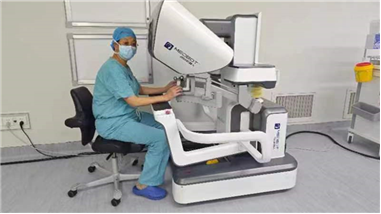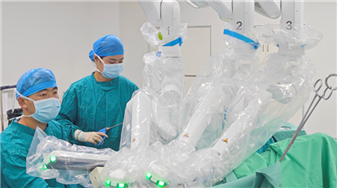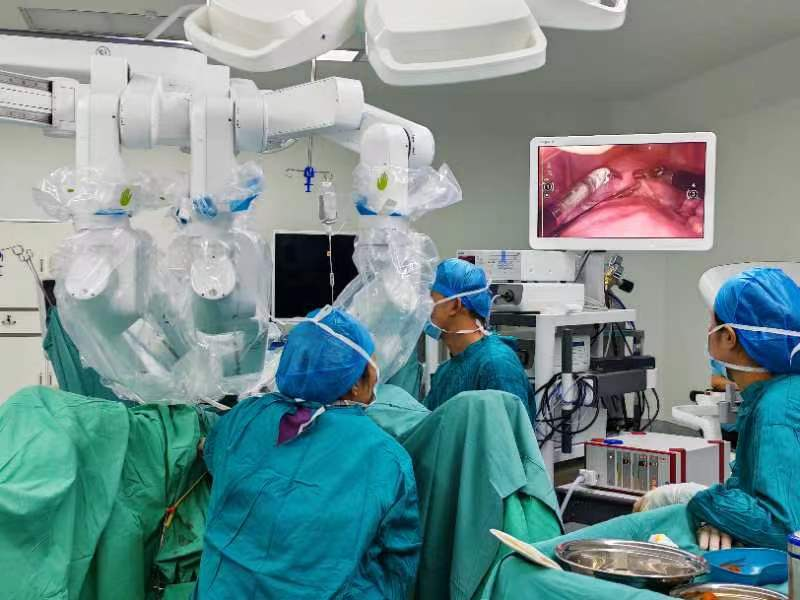Safeguarding Her Health: The Innovative Journey of Domestic Surgical Robots in Gynecologic Oncology
Safeguarding Her Health: The Innovative Journey of Domestic Surgical Robots in Gynecologic Oncology
—The Remarkable Performance of Robotics in Gynecologic Oncology Surgery
China’s first domestically developed Toumai four-arm robotic surgical system has been in clinical use at our hospital for nearly a year. Leveraging its three-dimensional real-field visualization and highly flexible wristed instruments, surgeons have successfully overcome many limitations of traditional open and laparoscopic surgeries. The system has enabled the completion of various complex procedures, demonstrating distinct strengths in gastrointestinal, hepatobiliary, gynecologic, and urologic surgeries. This advanced medical approach not only offers patients more precise treatment but also significantly shortens recovery time and reduces hospital stays.
However, many patients still view this cutting-edge technology with unfamiliarity and concern. To address this, our department has pioneered monthly patient-provider seminars to popularize knowledge about robotic surgery and answer frequently asked questions.
Q: I’m uneasy about a robot performing the operation. What if it malfunctions mid-surgery? I’d prefer the chief surgeon to do it.
A: Robotic surgery isn’t performed bythe robot—it’s performed by the surgeon, with the robot acting as an assistant. The surgeon remains in full control, seated at a console operating the robot, which mimics the surgeon’s movements. Ultimately, it is the doctor who conducts the surgery.
The system consists mainly of a console and robotic arms. During surgery, a few 1–2 cm incisions are made, through which the arms are inserted. The surgeon sits at the console away from the operating table, viewing a magnified 3D image of the surgical field and manipulating handles to control the robotic arms with high accuracy and stability.
Q: What are the advantages of robotic surgery?
A:1.Enhanced Precision: The robot provides 3D high-definition vision with 10–15x magnification and 360-degree maneuverability, greatly improving accuracy. In contrast, 2D laparoscopy offers only a flat view, and even 3D laparoscopy magnifies only 4–6x. The robotic system excels at identifying fine anatomical structures. Its articulated arms simulate—and exceed—the flexibility of the human wrist, allowing multi-angle operation around target tissues.
2.Improved Outcomes: With robotic assistance, surgeons can more efficiently perform dissection, suturing, and knot-tying. The magnified view facilitates meticulous maneuvers, increasing the thoroughness of treatment.
Q: Is robotic surgery safe?
A: Surgical robots have been used internationally for over 30 years and in China for more than 20 years. The system is now mature, valued for its stability, precision, and fatigue-resistant operation. Every procedure is conducted under a surgeon’s supervision, and robotic surgeons possess extensive experience in traditional surgery, enabling them to manage emergencies effectively. Moreover, both surgeons and assistants must undergo rigorous training and obtain certification before performing robotic surgery.
3. The robot expands the surgeon’s visual field and improves operative accuracy while minimizing hand tremors, enhancing both smoothness and precision. Thus, robotic surgery is highly safe.
Q: I heard there’s a ¥30,000 start-up fee for robotic surgery. Can I opt for a later slot to avoid this fee?
A: Our hospital currently offers robotic surgery at a promotional rate—no start-up fee is required, and the cost is the same as conventional laparoscopy. Given its unique advantages, including faster recovery and shorter hospitalization, robotic surgery may even help reduce overall medical expenses.

Surgeon at Robotic Console

First Assistant: Patient's Right Side

Second Assistant: Uterine Manipulation and Vaginal Procedures
Gansu Wuwei Cancer Hospital Gynecologic Oncology Department

I. Department Overview
The Gynecologic Oncology Department of Gansu Wuwei Tumor Hospital was established in February 2004. After 19 years of development, it has grown into a specialized department for diagnosing and treating gynecological tumors, integrating modern equipment, advanced technology, high-quality services, and innovative practices. It was designated as a municipal key specialty in 2022. The department boasts a complete and well-structured team of 20 staff members, including 7 physicians and 13 nursing personnel. The physician team comprises 2 Chief Physicians, 1 Associate Chief Physician, 2 Attending Physicians, and 2 Resident Physicians. The department currently has 40 open beds. In recent years, the entire medical staff has continuously enhanced their skills, advanced the diagnosis, treatment, and techniques for gynecological malignancies, and strives to become a provincial-level key discipline.
II. Department Characteristics and Expertise
The department routinely performs standard clinical procedures expected of a tertiary hospital, including but not limited to:
• Cervical Procedures: Loop Electrosurgical Excision Procedure (LEEP), Cold Knife Conization (CKC).
• Hysterectomies: Total Hysterectomy, Modified Radical Hysterectomy, Radical Hysterectomy.
• Surgeries for Gynecologic Cancers: Comprehensive Staging Surgery for Ovarian Cancer, Maximal Cytoreductive Surgery for Ovarian Cancer, Radical Surgery for Cervical Cancer, Radical Vulvectomy for Vulvar Cancer, Staging Surgery for Endometrial Cancer.
• Lymph Node Dissections: Pelvic Lymphadenectomy, Inguinal Lymphadenectomy.
• Laparoscopic Procedures: Laparoscopic Hysterectomy, Laparoscopically Assisted Vaginal Hysterectomy (LAVH), Laparoscopic Myomectomy, Laparoscopic Adnexectomy, Laparoscopic Excision of Ovarian Endometrioma, Laparoscopic Salpingostomy for Ectopic Pregnancy, Laparoscopic Ovarian Cystectomy, Laparoscopic Management of Ovarian Pregnancy, Laparoscopic Ovarian Drilling.
• Other Surgeries: Manchester Operation (partial cervicectomy with anteroposterior colporrhaphy), Resection of Complex Pelvic Tumors, Laparoscopic Radical Surgery for Endometrial Cancer.
The department also routinely provides adjuvant therapies for gynecological malignancies, including chemotherapy, intraperitoneal perfusion chemotherapy, bioimmunotherapy, and targeted therapy.

III. Academic Leader
• Director of the Gynecologic Oncology Department, Wuwei Medical Science Academy, Associate Chief Physician. 2
• Committee Member, Gynecology and Obstetrics Branch, Gansu Medical Doctor Association.
• Committee Member, Gynecologic Oncology Professional Committee, Gansu Anti-Cancer Association.
• Committee Member, Oncology Professional Committee, Gansu Geriatrics Society.
• Committee Member, Second Popular Science Professional Committee, Gansu Medical Association.
• Committee Member, Gynecologic Oncology Professional Committee, Gansu Geriatrics Society.
• Director, Gynecologic Oncology Professional Committee, Wuwei Medical Association.
• Committee Member, Obstetrics and Gynecology Branch, Wuwei Medical Association.
• Standing Committee Member, Obstetrics and Gynecology Professional Committee, Wuwei Integrated Traditional Chinese and Western Medicine Society.
With over 20 years of experience in gynecological clinical work, the academic leader is primarily dedicated to the diagnosis, treatment, and research of gynecological diseases and tumors. They have presided over the completion of 2 Wuwei City scientific projects, receiving one Third Prize of Gansu Medical Science and Technology Award and one Second Prize of Wuwei Science and Technology Progress Award. One Wuwei scientific project is currently in progress, and they have participated in completing 4 other Wuwei scientific projects. They have published 7 papers in national and provincial journals.
Consultation Phone: +86 0935—2266423, 2267957
Hospital Address: 2nd Floor, Building 6, Wuwei Heavy Ion Center, Gansu Wuwei Cancer Hospital.
Preliminary Review: Zhang Lihong
Final Review: Zhang Jie
